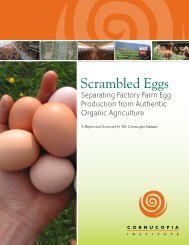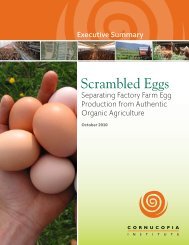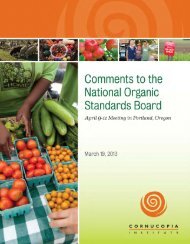“Behind the Bean” (pdf) - Cornucopia Institute
“Behind the Bean” (pdf) - Cornucopia Institute
“Behind the Bean” (pdf) - Cornucopia Institute
You also want an ePaper? Increase the reach of your titles
YUMPU automatically turns print PDFs into web optimized ePapers that Google loves.
Commitment to Supporting<br />
North American Organic Family Farmers<br />
“If people want high-quality organic food grown by American family farmers, <strong>the</strong>y need to support us not only<br />
when times are good, but also when times are bad.”<br />
– Phil Lewis, organic farmer in Kansas and owner of Lewis Ag Service,<br />
which supplies organic soybeans for Small Planet Tofu.<br />
Sa l e s o f s o y f o o d s a n d beverages increased 29% between<br />
2003 and 2007. 23 Despite <strong>the</strong> surge in consumer<br />
demand for organic soy-based foods in <strong>the</strong> United States,<br />
USDA data suggests that <strong>the</strong> number of domestic acres<br />
planted with organic soybeans is decreasing. In 2002, <strong>the</strong><br />
first year of USDA organic certification, 126,000 acres<br />
of organic soybeans were grown in <strong>the</strong> United States. In<br />
2005, <strong>the</strong> most recent year for which <strong>the</strong> USDA has data,<br />
that number dropped to 122,000. 24<br />
According to two USDA economists, “U.S. organic soybean production<br />
started declining several years ago as low-cost production began<br />
to increase in developing countries.” 25 Some family farmers growing<br />
organic soybeans tell a similar story: when China started to offer organic<br />
soybeans at a slightly lower price, some companies, like industry<br />
leader Dean Foods and its Silk soymilk brand, took advantage of<br />
<strong>the</strong> lower prices from China. In China, 40,000 hectares of farmland<br />
were certified organic in 2002, this number increased by over 1000%<br />
to 3,466,570 hectares in 2006. 26<br />
Photo courtesy of TOFU Phil.<br />
While companies like Dean Foods<br />
told its Silk customers a couple<br />
of years ago that it had to go<br />
to China because of domestic<br />
shortages, o<strong>the</strong>rs like Small<br />
Planet Tofu continued to work<br />
with <strong>the</strong>se farmers in Kansas,<br />
showing <strong>the</strong>ir commitment to<br />
supporting American organic<br />
agriculture.<br />
Based on our own research, using import data, we estimate that<br />
close to 100 million kilograms of organic soybeans and soymeal were<br />
imported from Asia between March 2008 and March 2009. Today,<br />
<strong>the</strong>re is indeed a shortage of domestic organic soybeans. Years ago,<br />
when China offered cheap organic soybeans, some companies did<br />
not hesitate to purchase Chinese soybeans instead of supporting<br />
North American family farmers and domestic organic soybean production.<br />
Now that companies and consumers are wary of Chinese<br />
imports, and looking for domestic sources, <strong>the</strong>y are encountering<br />
a shortage of high-quality organic soybeans. Some brokers have<br />
standing orders from food manufacturers for domestic beans, which<br />
will likely remain unfilled. These food manufacturers will have no<br />
choice but to go abroad, shut down <strong>the</strong>ir businesses, or switch from<br />
organic to “non-GMO” conventional.<br />
The important difference between companies sourcing Chinese soybeans<br />
and those still sourcing all American-grown organic soybeans<br />
is <strong>the</strong> company’s commitment to domestic organic agriculture.<br />
While companies like Dean Foods told its Silk customers a couple<br />
of years ago that it had to go to China because of domestic short-<br />
16 Behind <strong>the</strong> bean: The Heroes and Charlatans of <strong>the</strong> Natural and Organic Soy Foods Industry.





